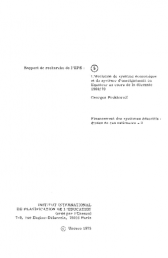
Langues
Anglais
Co-éditeur
United Nations Children's Fund
Collections
Country notes. Education sector planning
Année
2014
Pages
41 p.
Country
Version en ligne
A propos de la publication
In a growing number of countries, a significant reform in educational management is under way: schools which in earlier years had very little or no say in financial management now receive grants directly from central authorities. The actual impact of school grants on quality and equity needs deeper investigation because it is strongly influenced by the design and implementation of grants, the simple existence of such grants does not guarantee success. IIEP-UNESCO and UNICEF coordinated a research programme in Eastern and Southern Africa from 2010 to 2012, in order to better understand how the school grants policy is implemented in and by different schools, and to learn what its real contribution is to the grand policy objectives it is intended to serve. The research covered Ethiopia, Kenya, Lesotho, Malawi, and Uganda, through a collaboration with Ministries of Education, national research institutes, and the Centre for Education Policy Development (CEPD, South-Africa). The study was conducted in Lesotho in 2010, in collaboration with the National University of Lesotho (NUL), the Ministry of Education and Training (MoET), and the UNICEF Country Office. The utility grant was introduced subsequent to the launching of the Free Primary Education policy in 2000. The present study examines the use and usefulness of this school grants policy in Lesotho, with specific attention given to six key themes: the policy formulation and dissemination process, criteria and mechanisms for grant distribution, the actual use of the funds at the school level, the existence of control mechanisms, and the contributions of grants to access, equity and quality. The last chapter provides a set of recommendations for improvement of the policy.









